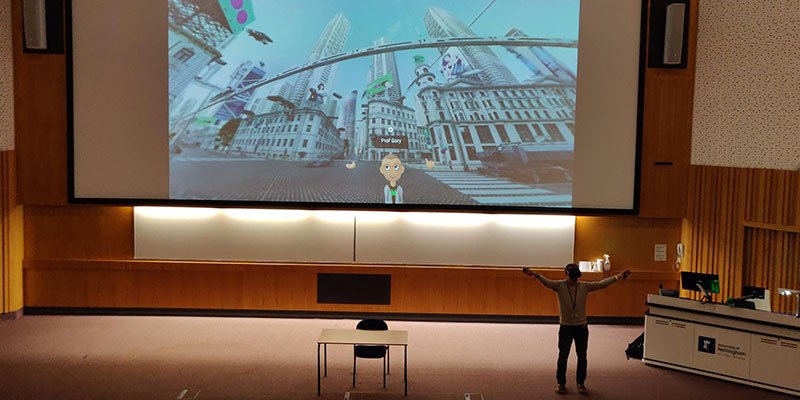Are avatars the answer for tertiary education?
Gary Burnett, professor of digital creativity at Loughborough University, will offer a thought-provoking alternative vision for the future of education at Digifest 2024.
A major use-case for immersive technologies in education will involve the use of virtual worlds. Such worlds are synonymous with social interaction, as users (personified in avatar form) are free to move, communicate and collaborate in seemingly natural but potentially magical ways.
But what are the experiences of students as avatars in virtual worlds? Does being an avatar lead to positive or negative outcomes?
Attendees at Digifest will be treated to a glimpse into a potential future where staff engage with students as avatars in fantastical and engaging virtual worlds when Gary Burnett, professor of digital creativity at Loughborough University, shares insights gained from teaching almost 300 university students about virtual reality (VR) - predominantly from within VR.
Motivated by the awareness that students must be prepared for an emerging world in which digital work and leisure lives increasingly involve immersive 3D media experienced as an avatar in the first-person, Gary has been investigating the role of emerging metaverse-related technologies in traditional university teaching.
His talk at Digifest will focus on his observations of the positive (and negative) experiences of his students as avatars across a semester, exploring key themes of identity, anonymity, interaction, usability and accessibility.
Ultimately, he says, his aim will be to provoke the audience with a radical departure from the re-established post-COVID norm for academic teaching.

Avatars: virtual substitutes in a digital world
Technologies such as virtual, augmented, extended and mixed reality present a new way to educate and socially engage students in exciting and creative ways.
Drawing on gaming conventions that will be familiar to most learners, users are represented by avatars which serve as substitutes for them in a virtual environment. In theory, these avatars can facilitate mediated interactions with others by allowing users to communicate in different and potentially more engaging ways.
However, little is known about how students make use of avatars (especially over an extended period) and the subsequent impact on learning experiences. Gary wanted to find out whether immersing students in physically and psychologically safe spaces really does heighten their agency to imagine the impossible.
The advantages – and disadvantages – of avatars
For the last three years, Gary has been leading a module conducted within a persistent virtual world, where students predominantly interact with each other and with teaching staff in avatar form. Observation data including 60 hours of video recordings of virtual world seminars, as well as student surveys and interviews, shows that the experience of learning on this module was extremely positive.
Students found there were many advantages to being an avatar, including the ability to express oneself in original and engaging ways, and increased confidence to speak up in class. They also appreciated the ability to move more freely within the virtual environment, which they felt was less restricted by social norms and reduced the focus on actual physical appearance.
Disadvantages, however, were also apparent, including the distracting nature of certain avatars, usability challenges in designing an avatar, and a lack of sense of self.
Next steps for avatars in education
Having designed and built several fantastical virtual teaching worlds and acquired valuable expertise in how such novel learning spaces can successfully be used in university contexts, Gary now proposes an initial design framework for the use of avatars in tertiary education.
He has also been invited to join a new Jisc steering committee focused on the role of extended reality technologies within the sector.
Find out more
Register for Digifest 2024 to attend Gary's session on avatars and the skills students need for an increasingly immersive world.